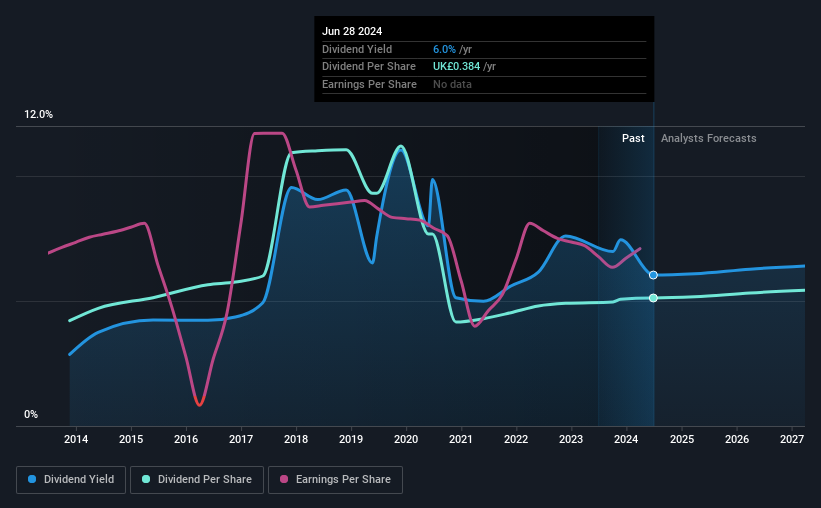Stock Analysis
- United Kingdom
- /
- Diversified Financial
- /
- LSE:PAY
Dividend Investors: Don't Be Too Quick To Buy PayPoint plc (LON:PAY) For Its Upcoming Dividend

Readers hoping to buy PayPoint plc (LON:PAY) for its dividend will need to make their move shortly, as the stock is about to trade ex-dividend. The ex-dividend date is one business day before the record date, which is the cut-off date for shareholders to be present on the company's books to be eligible for a dividend payment. It is important to be aware of the ex-dividend date because any trade on the stock needs to have been settled on or before the record date. Accordingly, PayPoint investors that purchase the stock on or after the 4th of July will not receive the dividend, which will be paid on the 6th of August.
The company's next dividend payment will be UK£0.096 per share, on the back of last year when the company paid a total of UK£0.38 to shareholders. Looking at the last 12 months of distributions, PayPoint has a trailing yield of approximately 6.0% on its current stock price of UK£6.36. Dividends are a major contributor to investment returns for long term holders, but only if the dividend continues to be paid. We need to see whether the dividend is covered by earnings and if it's growing.
See our latest analysis for PayPoint
If a company pays out more in dividends than it earned, then the dividend might become unsustainable - hardly an ideal situation. It paid out 78% of its earnings as dividends last year, which is not unreasonable, but limits reinvestment in the business and leaves the dividend vulnerable to a business downturn. It could become a concern if earnings started to decline.
When a company paid out less in dividends than it earned in profit, this generally suggests its dividend is affordable. The lower the % of its profit that it pays out, the greater the margin of safety for the dividend if the business enters a downturn.
Click here to see the company's payout ratio, plus analyst estimates of its future dividends.

Have Earnings And Dividends Been Growing?
Companies with falling earnings are riskier for dividend shareholders. If earnings fall far enough, the company could be forced to cut its dividend. Readers will understand then, why we're concerned to see PayPoint's earnings per share have dropped 5.3% a year over the past five years. Such a sharp decline casts doubt on the future sustainability of the dividend.
Another key way to measure a company's dividend prospects is by measuring its historical rate of dividend growth. Since the start of our data, 10 years ago, PayPoint has lifted its dividend by approximately 2.0% a year on average.
Final Takeaway
Is PayPoint an attractive dividend stock, or better left on the shelf? We're not overly enthused to see PayPoint's earnings in retreat at the same time as the company is paying out more than half of its earnings as dividends to shareholders. PayPoint doesn't appear to have a lot going for it, and we're not inclined to take a risk on owning it for the dividend.
Having said that, if you're looking at this stock without much concern for the dividend, you should still be familiar of the risks involved with PayPoint. For example, we've found 3 warning signs for PayPoint (1 can't be ignored!) that deserve your attention before investing in the shares.
If you're in the market for strong dividend payers, we recommend checking our selection of top dividend stocks.
Valuation is complex, but we're helping make it simple.
Find out whether PayPoint is potentially over or undervalued by checking out our comprehensive analysis, which includes fair value estimates, risks and warnings, dividends, insider transactions and financial health.
View the Free AnalysisHave feedback on this article? Concerned about the content? Get in touch with us directly. Alternatively, email editorial-team (at) simplywallst.com.
This article by Simply Wall St is general in nature. We provide commentary based on historical data and analyst forecasts only using an unbiased methodology and our articles are not intended to be financial advice. It does not constitute a recommendation to buy or sell any stock, and does not take account of your objectives, or your financial situation. We aim to bring you long-term focused analysis driven by fundamental data. Note that our analysis may not factor in the latest price-sensitive company announcements or qualitative material. Simply Wall St has no position in any stocks mentioned.
Valuation is complex, but we're helping make it simple.
Find out whether PayPoint is potentially over or undervalued by checking out our comprehensive analysis, which includes fair value estimates, risks and warnings, dividends, insider transactions and financial health.
View the Free AnalysisHave feedback on this article? Concerned about the content? Get in touch with us directly. Alternatively, email editorial-team@simplywallst.com
About LSE:PAY
PayPoint
Engages in the provision of payments and banking, shopping, and e-commerce services and products in the United Kingdom.
Established dividend payer with proven track record.

